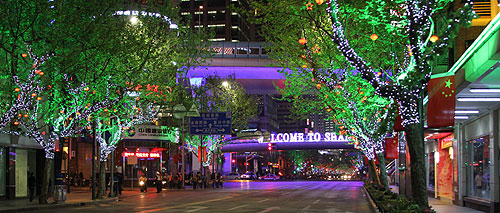Shanghai
Shanghaied
Text and Photos by Sam Quarelli Fleming
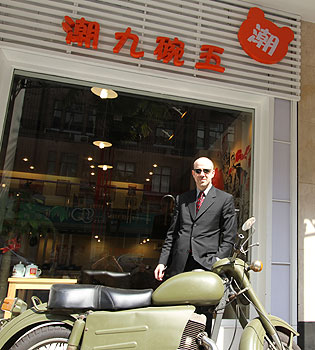
Our Wildcard Editor was assigned to cover the World Expo in Shanghai, China. Unfortunately we were remiss in giving him explicit instructions to write something, anything, related to motorcycles. Instead he smuggled a miscellaneous collection of photos and text out of the country with a note that said: “Shanghai isn't much of a motorcycle town: it is contrasts, it is beauty, it is history, it is pride, it is humiliation, it is aspiration, it is defeat, it is peerless, it is a story in and of itself. -SPQF .” We've pieced it together as best we could but the captions don't always seem to go with the pictures.
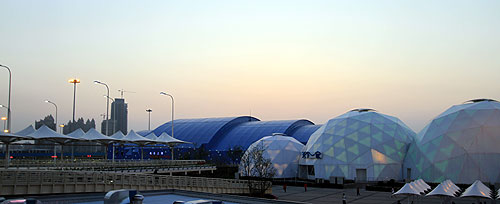
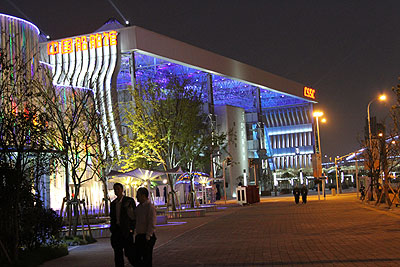
China has long been an introspective nation, but at various points over the last 1,000 years the Celestial Kingdom looked outwards. For instance, The Ming Dynasty (1400) built a massive blue water merchant and naval fleet. They charted the Australian coast, they established far flung trading ports, they engaged in trade with other dynasties and kingdoms. They were in a perfect position to rival Portugal, Spain and Britain in colonialist expansion. Instead, palace rivalry undermined the absent naval commander such that, upon his return, he was imprisoned and the entire fleet was burned. China didn't look much beyond its land borders for another 500 years. Modern China has hosted two large events which are designed to impress the world as well as to prove the effectiveness of the government to the local populace. The first event was the Beijing Olympics. The second is the World Expo. The World Expo in Shanghai is 10 times larger than any expo in recent history and features pavilions from countries around the world. The expo will be around for about six months, after which most of the buildings will be demolished. It is expected that 70 million people will visit the expo in the six months it is open.
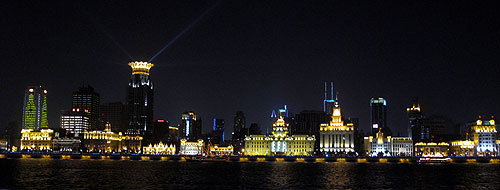
From 1800 onward, China suffered massive insults and indignities at the hands of foreign powers. Much of the lingering surly and mistrustful nature of their relations with the West (and their neighbors for that matter) are the result of the horrible actions aimed against the Chinese in the last 150 years. Not to be all “rah rah dictatorships,” but you have to look at it from their perspective to some extent. Although America did come to China's defense against the Japanese at the start of WWII (before the US was at war with Japan!) basically China was invaded, colonized and humiliated by Britain, France, Japan, and, to a lesser extent, the US from about 1850 onward. Shanghai was often ground zero for the economic and military invaders, as well as the primary port of export for the wealth being extracted from China. The displacement of wealth from China was so great that in 1870 Shanghai was the fifth busiest port in the world. The Bund (pictured above at night) was the commercial center of the city during the colonial period.
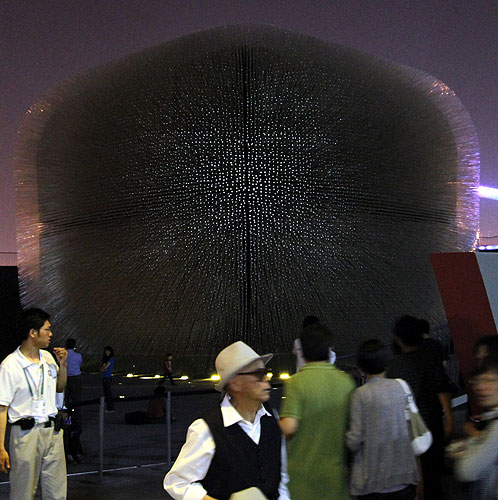
Since the 1600s, the British had wanted to trade with China. China didn't want anything to do with the smelly (literally, East and West had immensely different ideals of hygiene at the time) British; that and Britain was trying to trade wool for silk and tea. The Chinese were understandably cool to the idea of trading silk for wool so the British needed a better trade good. As the US army is currently discovering in Afghanistan, as far as cash crops go, nothing beats opium! The only problem was that the Chinese government wasn't enthusiastic at the idea of converting their hard working industrious population into opium addicts. So in 1840, British merchants convinced the British military to shell Chinese cities until the Chinese cried 'uncle.' The terms of surrender allowed the British to establish trading ports called “concessions” so the British could then sell opium and buy silk and tea. The British were basically a bunch of smack dealers. The British built this fiber-optic covered building for the expo.
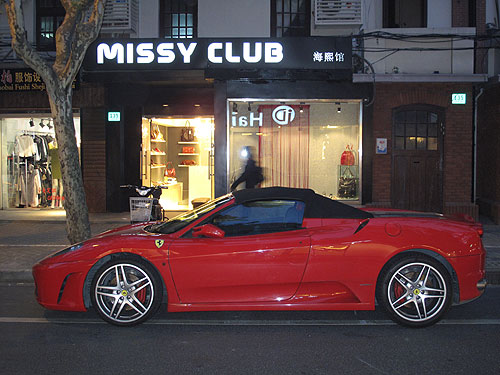
This trading concession deal looked pretty good to other aspirational powers. The French, Japanese and Americans all sent battleships to China. The Chinese allowed the establishment of more concessions. The most famous of these concessions are all in Shanghai, including the International Concession and the French Concession, as well as the Japanese Zone. Each of these areas was treated as sovereign territory by the colonizing power, complete with their own police forces, laws, underworlds, etc. The fast money available in Shanghai combined with the relative lawlessness of the place created the world's greatest nightlife with legalized gambling, prostitution, opium and money. Lots and lots of money.

Like in modern day Japan, Italy and New Jersey, in the 19th century it was impossible to distinguish between legal and criminal enterprise in Shanghai. One of the largest gangs in Shanghai was the Green Gang. The Green Gang was an organization dedicated to a blend of commerce, crime, and politics. Eventually the crime rate escalated to the point where it was beginning to negatively impact the continuous festivities of the city. The solution was elegant: the city simply appointed the head of the Green Gang to be the chief of police and established a maximum allowable crime rate. Problem solved!
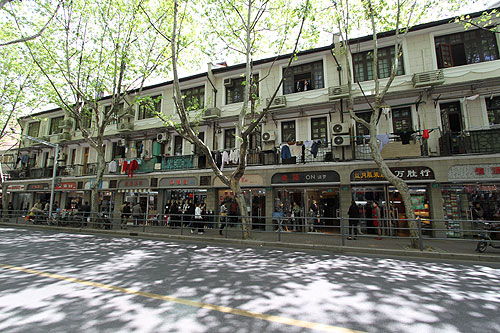
In the late 1930s there was a string of foreign gunships moored at buoys in the Hangpu river. The Japanese, blinded by their sun god emperor (he only renounced personal divinity in 1946) and the trendy aspiration for empire asked for additional concessions from Shanghai. When refused, they staged an incident with some of their sailors getting mugged, and commenced shelling one section of the city from their gun boat. While this was occurring, life continued relatively uninterrupted in the rest of the city. Two years later the Japanese occupied the city and took to regularly torturing and executing civilians.

World War II had the predictable effect of ending a century of decadence in Shanghai. The end of the war saw a flood of US soldiers but this time it was merely a temporary occupation, not the spear tip for a merchant force. With the end of the war with Japan, China immediately erupted in civil war. Former Green Gang leader Chang Kaishek raised an army from Shanghai and launched a war against the communist central government. It didn't work out that well for him so he retreated with his forces to an island and negotiated an uneasy truce/ceasefire with the mainland. That island is called Taiwan now. China considers it a renegade province, Taiwan considers itself an independent country. They try not to talk about it too much because it just gets everyone all riled up. However, everyone can agree that Shanghai street dumplings are a tasty lunch.

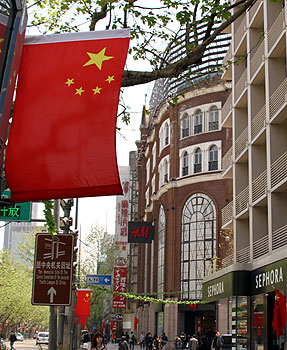
Mao Tse Tung organized another political party in Shanghai as well. This party, using tactics lifted from Stalin's playbook, inflicted terrible suffering on the Chinese people. This ran the gamut: executions, torture, displacement, starvation (accidental and intentional) so millions of people suffered and died. However, Mao did succeed in ending foreign occupations of China (except for the leases on Hong Kong and Macau which took a little longer to expire) and ending the civil wars that had ravaged China. In China he is still revered as the father of modern China, without much publicity about the atrocities. There is a statue to communist philosophers Engles and Marx in a park in downtown Shanghai but folks seem more interested in the luxury stores two blocks away.
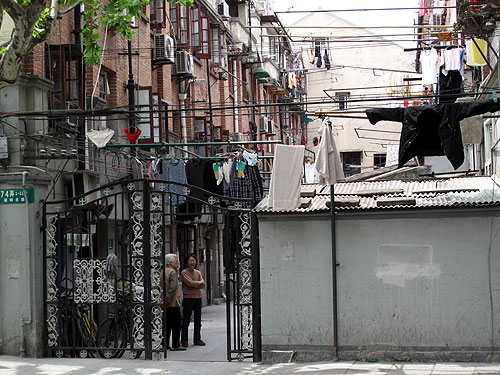
As a beautiful blend of the loose fitting clothes of the Qing Dynasty in the early 1900s mixed with some confused retailers, Shanghai was known for the fashion of pajamas. The living quarters of Shanghai (kind of a mix of college dorms and garden apartments) along with the sticky summers encouraged residents to wear pajamas all day long, in public. Although I was able to witness this on occasion, the Chinese government had decided that it would reflect poorly on China for visitors to the World Expo to observe behavior that might be considered backwards, so a private police force was deployed in the city to force people to go home and put on clothes if they were out in public in pajamas. Alas.
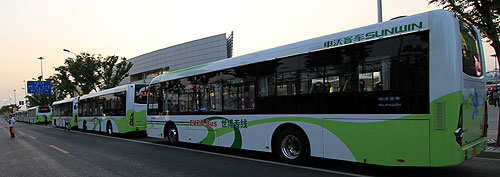
China is big into electric vehicles. Electric buses and electric mopeds are common. Your editor was most impressed with the magnetic levitation train that runs from the Shanghai airport to the city. Although he was a jet lagged idiot and totally fell down on getting pictures of it, this train went 268mph and was so smooth that most passengers remained standing ala a subway car instead of sitting down. The trip is 19 miles and takes about 7 minutes. The same trip by taxi takes about 45 minutes.
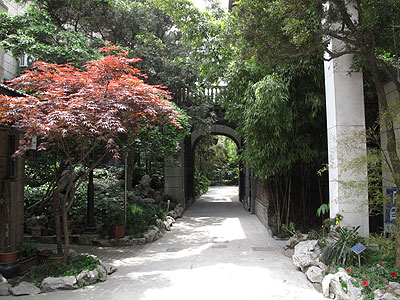
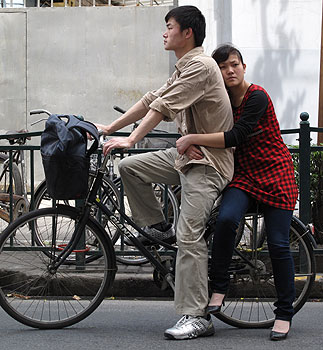
China is heavily polluted due to rapid industrialization with very limited thought or consideration to environmental consequences. Kinda like what the US would have done without the environmentalist movement. In the 1960s many waterways in the US were flowing industrial sewers and the air was filled with vaporized lead and un-scrubbed chimney stacks. That's pretty much how China is now. The rivers are heavily polluted and the air is thick with the smog from cars and industrial plants without pollution controls. That said, the streets are clean and the gardens are meticulously maintained.
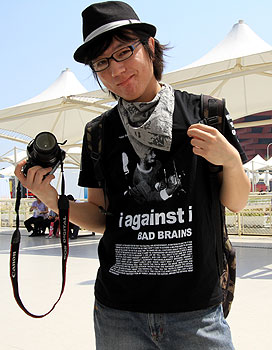
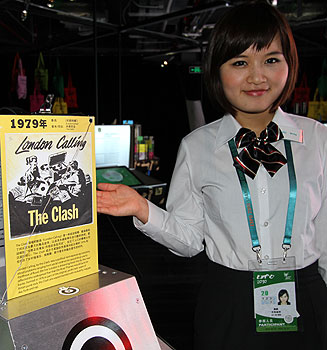
Your correspondent is reasonably well traveled and has made friends all around the world. That said, he was deeply impressed by the friendly, hospitable nature of the Shanghai residents. Chance interaction with strangers on the street led to evenings philosophizing over a bottle of complimentary prosecco, impromptu sight seeing trips and dinner invitations. One such encounter was with a fan of the best album by the best band ever to come out of your editor's hometown of DC (sorry Rites of Spring and Trouble Funk, but you know it to be true) and another was with Jing Jing, the beautiful and talented interpretive hostess at the London pavilion posing with the only band that really matters. The warmth and intelligence of the Chinese individuals encountered by your editor contrasted dramatically with the somewhat more dictatorial nature of the Chinese government.
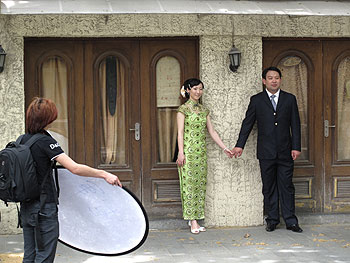
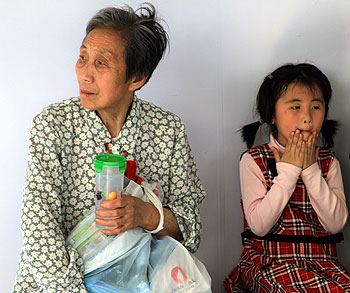


At about 1.3 billion people, China has the largest population of any country in the world. The population is four times the size of the US and has almost doubled since 1960. To slow the rate of population growth, China imposed the controversial “one child” policy in 1978 where urban couples are only allowed to have a single child. This policy is still in effect (although I met a Chinese billionaire on his third kid) and has led to problems with a soon to be dramatically reduced work force, systemic female infanticide and subsequently, millions of young men who will never marry.
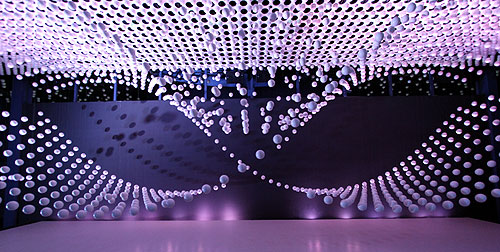
At the World Expo, 16 of the largest private corporations in China decided to demonstrate to the world that China’s attitude towards private enterprise was changing, and the Chinese economy had opened to entrepreneurs. They selected the 2010 World Expo in Shanghai as the platform for their statement to both the Chinese population and visitors from around the world, and sponsored one of the pavilions in the commercial section of the expo. They hired Army Of Darkness rider Scott Fisher to design and build a technological attraction for their pavilion. Scott built a sculpture with 1,008 moving spheres which are dynamically programmed to form shapes and wave effects. The vice president of China declared it the coolest thing at the expo. You can see a video of the effect under “Special Events” at the fishertechnical.com website.

China filters all Internet traffic in the country. This is called the “Great Firewall of China.” Filtered sites and content simply do not resolve or throw error messages from inside the country. This makes the censorship somewhat insidious because censored sites appear to just be poorly performing. The filtering also makes for very slow Internet performance. Non sequitur – guards walk thru mist generated by pressure fed nozzles in the side walk at the Expo.
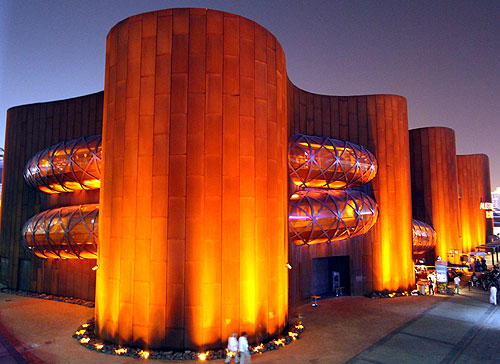
The Australian economy is currently based on strip mining the northwestern portion of the country for iron ore, coal and uranium and shipping it to China for processing. The Australian pavilion pays tribute to this relationship with its “rusted iron” facade and its gravel base of iron ore. In typical tongue and cheek fashion, the Aussie bar band performing to the all-Chinese crowd (lower right of picture) was taking ironic liberties with the lyrics of traditional songs.

China has been busy establishing multi-polar diplomatic and economic ties around the world. One of the principle concerns in China is feeding its burgeoning population under severe water shortages. Chinese national corporations have been buying or leasing vast tracts of arable land in Africa to produce cereals for import back to China. The African national presence at the World Expo was massive and included both national presentations and very well attended cultural events.


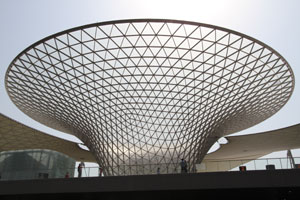
Clearly the Olympic opening ceremony and the World Expo architecture are meant to impress the world. Clearly both succeeded. This red building is HUGE, the spaceship is breathtaking and the glass funnel is one of about twenty that make up a huge covered walkway. The funnels are meant to guide rain water to gardens at their bases as well as create a passive ventilation system of hot air expanding up and out while fresh air is pulled into the building layers below.
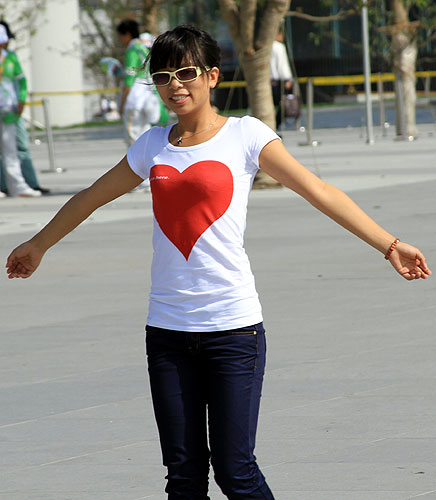
Twenty years after the US fought alongside the Chinese against the Japanese, the US and China found themselves embroiled in a brutal war against each other in Korea. That war in Korea is not officially over, it has just been in a state of cease fire for 50 years. Your correspondent has high hopes that this young woman will be the one to solve the notoriously difficult diplomatic, military and economic challenges of the Korean peninsula.

What is the lesson we can learn from this history? We currently run a massive trade deficit with China due to their exploitative labor practices and lack of environmental controls. We also, for the moment, kinda sorta vaguely control Afghanistan. Afghanistan is the world's largest producer of what valuable trade good? OPIUM! A modest proposal would be get the Chinese to allow us to sell 'foreign mud' again!
If you're curious about the history of Shanghai, check out Shanghai: The Rise and Fall of a Decadent City, by Stella Dong.

